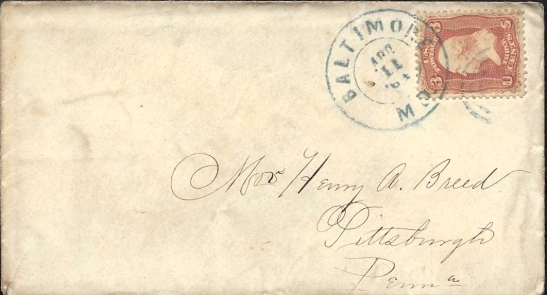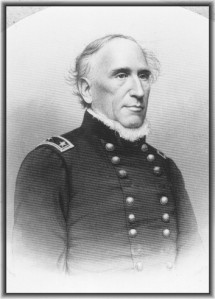
Image courtesy of the Library of Congress.
This letter was written by 2Lt. Joseph (“Joe”) Z. Culver (1841-Aft1904) of the 39th U. S. C. T. (Colored Troops). Joe was 21 years old when he mustered into federal service at Pittsburgh, Pa., for three years as a private in Company D, 10th Pennsylvania Reserves, on Sept. 11, 1862. He was honorably discharged on Feb. 28, 1864, to accept a commission as 2d lieutenant in the 39th U.S. Colored Troops. Culver was mustered in as 2d lieutenant. Company C, 39th U.S.C.T., at Baltimore on Feb. 29, 1864. He was promoted to 1st lieutenant on Sept. 13, 1864, and transferred to Company K.
The 39th USCT organized at Baltimore on March 22-31, 1864 and was soon posted to the area of Manassas Junction. The photograph above may have been taken on the afternoon of May 5, 1864, when the 39th and the rest of the Fourth Division joined what became known as the Overland Campaign by crossing the Rappahannock River and passing through the Brandy Station area towards a bivouac point on or near Mountain Run not far from Culpeper. The regiment’s first tactical deployments, on the flanks and in the rear of the Ninth Corps and the Army of the Potomac, came after it crossed the Rapidan at Germanna Ford early on May 6.
The 39th U. S. C. T. was one of the colored regiments under the command of Gen. Edward Ferrero in the fatal assault on the Confederate works before Petersburg in what has become called the Battle of the Crater on 30 July 1864. In that assault alone, the 39th U. S. C. T. sustained at least 154 casualties.
Joseph’s service as a white officer of colored troops was apparently frowned upon by many of his relatives, one of who wrote: “I recd. a letter from Joe Z. Culver, formerly of the 10th Penna. Vols., and now a 2nd Lieut. of the 39th U. S. Cold. Troops. He says the folks at home are rather opposed to his position; if they are of the same persuasion as Sister Beccie [Pague], I have no doubt they are.” [Source: Joseph F. Culver Civil War Letters, 27 March 1864]
See Publication: Letters from Officers of the 39th U. S. C. T. by Joseph Z. Culver (1889)
Joseph wrote the letter to his friend, Henry Atwood Breed (1842-1914) of Pittsburgh, Pennsylvania. He was the son of George Breed (1799-1863) and Rhoda Ogden Edwards (1805-1867). He married Cornelia Bidwell (probably the “Miss C. B.” mentioned in this letter) in October 1868. Henry served as a 2LT of Company F, 155th Pennsylvania Infantry from August 1862 until October 1863. In the 1870’s, Henry worked for the Culmer Spring Company in Allegheny — a manufacturer of spiral springs (for railway use).
TRANSCRIPTION
Addressed to Mr. Henry A. Breed, Pittsburgh, Pennsylvania
Camp Birney
April 10th 1864Mr. Henry A. Breed
Dear Sir,You are my most desirable correspondent of Oakland, perhaps from the fact that no one else has so much that is interesting to write, perhaps from other causes, and I am conscious that I owe you special attention.
Our regiment is now about full and a majority of the officers have reported. With very few exceptions the latter are all from the army. They are practical soldiers and that means jolly good-hearted fellows, besides being men of tolerable education, for I can assure you that very few pass that august board of Gen. [Silas] Casey’s without some qualifications. ¹ I have had command of a company of eighty men during the last two weeks and from raw recruits who did not know right from left face, I think I have now a company which you would be pleased to command for an hour or two merely to see execute some nice movements, They learn to march with a readiness which would do honor to men of much superior education. They imitate everything which they see done and my judgement and every other faculty I will regard as useless if these men fail to make the very best of soldiers. ²
Recruiting is going on very rapidly throughout this state among the colored population at present. Maryland may fill her quota from her blacks. We had a splendid dress parade this evening. It being Sunday, a great crowd from Baltimore of all colors and both sexes was in attendance. We had a line of over nine hundred men — almost equal to a brigade in the army — and made what I thought a rather grand appearance.
Baltimore is avery fine city to live in and quite as agreeable to form acquaintances in. I have been here more than a month and I have come to the conclusion that living in camp in the army is one thing and residing here quite another. I am sorry, however, that you could not give me notice when Miss C. B. would pass or repass here on her visit to Washington. I would pass by all my acquaintances here for a view of one of Oakland’s daughters. You should have been a little more considerate, my dear sir, and not reported a fact about which so much information would most assuredly be desired.
Enclosed you will find my photograph which bears testimony (prima facia) from the color that I must be among black troops and you must be careful to impress this fact upon the minds of any who may look and smile upon the picture. Assure them that white officers of colored troops will most certainly become colored officers of white troops if they permit their immaculate reputations and characters to become tarnished. Such is the transition, my friend.
Send me some pictures of your lady friends if you have any. I always cast a wistful glance towards a Pennsylvania face. Remember my request and I will remain, sir, yours most truly, — Jos. Z. Culver, 2nd Lt., 39th U.S.C.T., Baltimore, Md.

¹ Joseph is referring to the rigorous examinations officer candidates were subjected to in order to prepare them for command, thus ensuring that their knowledge of drill, tactics, and military administration was comprehensive. Few candidates applying for commissions as officers of colored troops had actually been officers prior to joining their black regiments. Prior to receiving his commission, Joseph attended Philadelphia’s Free Military School which produced 484 officers who served with the U.S. C. T. Records indicate that 47% of the applicants failed in their attempts at this school to receive a commission. The commander of the Washington examination board was General Silas Casey. [Source: Paul D. Renard, The Selection & Preparation of White Officers for the Command of Black Troops in the American Civil War… (page 17)]
² Joseph expresses an opinion of black soldiers that was typical. Historian Paul D. Renard explains: “Some officers called on racist stereotypes to explain their troops’ excellence in drill, speculating that is was connected to the former slaves’ love of music or their natural status as order-takers. Letters from black soldiers and the opinions of less prejudiced officers indicate that they were successful because they paid more attention, took more pride in their drill, and understood the importance of their learning better than did white soldiers. Higginson simply commented that his soldiers were good students who “learn less laboriously than whites that ‘double, double, toil and trouble,’ which is the elementary vexation of the drill-master, – that they more rarely mistake their left for their right, – and are more grave and sedate while under instruction.”





Leave a comment